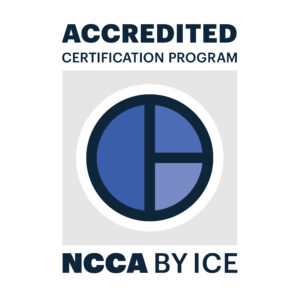CMCA EXAMINATION
The CMCA Examination is a 2.5-hour, 120-question multiple-choice exam (100 scored and 20-pilot test items)
that tests candidates in:
- Governance and Compliance
- Financial Management
- Risk Management
- Meetings and Events
- Property Maintenance
- Contracting
Examination Format and Fee
The CMCA examination is administered by Pearson VUE, a leading provider of computer-based certification examinations around the world. You can choose to take the examination anytime throughout the year (excluding major holidays) at a location near you.
Cost: The $360 fee includes the application fee, examination, and your first year of certification. CMCA candidates may retake the examination as many times as necessary for $200 per retake. Fees are nonrefundable and nontransferable.
Exam Dates: Candidates will have one year from the date their application is approved to sit for the CMCA examination and may test at any time within that one-year period.
Exam Locations: The CMCA examination is offered at Pearson VUE testing centers. Test center locations can be found at http://pearsonvue.com/cmca/
Instant Test Results: Immediately after you complete the examination, your test will be scored by Pearson VUE and you’ll be given the results. For more information on examination scoring, please see the CMCA Handbook.
Examination Eligibility
The Certified Manager of Community Associations (CMCA) is the only international certification program designed exclusively for managers of homeowner and condominium associations and cooperatives. The CMCA is an entry‐level credential that recognizes individuals who have demonstrated the fundamental knowledge required to manage community associations.
All applicants must meet one of the following requirements:
- Option 1: Education – Complete and pass one prerequisite course on community association management.
- Option 2: Experience – Demonstrate at least two years of experience as a community association manager to receive a one‐time waiver of the prerequisite course. The experience must be as a community association manager—not as an assistant manager. If the candidate does not successfully pass the examination the first time, he/she will be required to take the prerequisite course prior to retaking the examination.
- Option 3: License or Credential – Hold an active license or credential approved by the Board.
Candidates must agree to abide by the CMCA Standards of Professional Conduct.
Rationale
Each eligibility requirement has been established to ensure that certified individuals have an acceptable level of knowledge and skills as set forth in the CMCA Professional Standards of Conduct.
Each eligibility requirement has been selected to support the purpose of the credential. The Board of Commissioners determined that each eligibility option supports an understanding of the knowledge, skills, and abilities required to perform effectively as a manager of a common interest community sufficient to position a candidate to challenge the CMCA examination with a reasonable chance of success.
- Option 1: Education: Each of the prerequisite courses recognized to establish CMCA examination eligibility has been approved by a committee independent of the Board. Each program is structured to offer an overview of the knowledge, skills, and abilities required of a professional community association manager and offers sound foundational learning as a manager prepares for the CMCA examination. The curriculum for each prerequisite course has been determined to align against the knowledge areas tested on the CMCA examination.
- Option 2: Experience: The experiential option is available to a candidate who, by virtue of a minimum of two full years of employment as a community manager, has been actively engaged in the tasks and general areas of activity tested on the CMCA examination. The experiential threshold was set by the consensus of the Board of Commissioners. A candidate with two years of experience (approximately 4,000 hours) as a working manager can be assumed to have experienced the full cycle of community operations – budgeting, seasonal maintenance, Board governance, and Board and association meetings – multiple times, building a thorough understanding of the knowledge, skills, and abilities to perform effectively as a community association manager. The experiential option is supported by the requirement that an experiential candidate failing the CMCA examination on an initial attempt must take a recognized prerequisite course before retesting.
- Option 3: License or Credential: The Board of Commissioners determined that the educational or experiential requirements and the background considerations in place to earn and maintain one of the licenses or credentials noted in the requirement will be considered equivalent to the education or experiential requirement in place for CMCA examination candidates and has recognized the licenses or credentials for the purpose of establishing eligibility for the CMCA examination.
The Board of Commissioners shall review requests for licensing and designations to qualify for status as a waiver of the education prerequisite to sit for the CMCA examination. Requests may be made by anyone and may be reviewed at regular meetings. If granting the status as a waiver, the Board shall consider the following:
- The license or designation is solely for community association management. The license or designation must treat community association management as a profession distinct from other real estate professions.
- The education and examination prerequisites are adequate. The license or designation must require at least 16 hours of education in the knowledge areas of community association management and the examination must cover those areas. These areas include, but are not limited to, the following: association governance, financial and risk management, ethics, maintenance and facility operations, legal document and contract provisions, and personnel management.
- The license or designation program is operational. Programs that have ceased operations may be granted a waiver up to two years following the cessation of operation.
The Board shall review the status of each program on a regular basis to determine if the program shall remain a waiver.
CRIMES OF MORAL TURPITUDE
The Board of Commissioners recognizes the degree of trust placed in a credentialed community association manager by homeowners, as well as the unique position the manager occupies in a common interest community. The Board reserves the right to review a conviction of any nature, within any timeframe, and to deny eligibility to test.
MEMBERSHIP
Membership in an association is not required for certification.
Re-Examination
A candidate failing the CMCA examination is eligible to retest by submitting a CMCA Retake Application and paying the required fee. The CMCA examination is offered as a computer‐based test on demand. There is no mandated waiting period between exam attempts and no cap on the number of attempts in a fixed timeframe.
Rationale
REQUESTS FOR SPECIAL TESTING ACCOMMODATIONS
Reasonable accommodations are based on:
- the individual’s specific request
- the individual’s specific disability
- documentation submitted
- the appropriateness of the request
Reasonable accommodations do not include steps that fundamentally alter the purpose or nature of the examination.
To apply for accommodation(s), the candidate must:
- Request the need for a special accommodation on the examination application and provide an explanation.
- Submit documentation to the Board provided by an appropriate licensed professional, on the professional’s letterhead, which includes a diagnosis of the disability and specific recommendations for accommodations.
Requests for accommodations for the exam will be reviewed by the Executive Director or designated CAMICB staff who will communicate approved accommodations to the testing company or designated exam proctor.
Examination Development
The CMCA examination reflects best practices in community association management. It tests applicants on a body of knowledge developed out of periodic analyses of the actual practice of community association management. 
CAMICB establishes the community association manager body of knowledge through extensive job analysis studies. The job analysis study gathers information about contemporary practices of community association management and comprehensively describes the functional areas and responsibilities performed by and the knowledge required of community association managers. The study is conducted consistent with the Standards for Educational and Psychological Testing. Those standards ensure that:
- Multiple data sources are used.
- A job analysis task force of subject-matter experts leads the study.
- Critical incident interviews and focus panels are used as additional resources.
- Extensive surveys are widely disseminated to community association management professionals.
The most recent job analysis was conducted in 2021-2022. Learn more about this process on our Exam Updates page. CAMICB uses process- and content-based approaches to delineate the functional areas of responsibility and the specific tasks performed by community association managers as well as the associated knowledge base.
To validate the identified knowledge areas, survey participants, and complete quantitative ratings on elements of the delineation, including:
- Percent of work time and importance ratings for the functional areas.
- Frequency, importance, and “performed by” ratings for the responsibilities.
Survey participants are given the opportunity to provide insight about practice changes that might occur in the next three to five years through open-ended questions. We also ask about areas of responsibility and knowledge that were omitted from the survey.
The task force reviews the survey results, including the descriptive statistics for the knowledge areas, responsibilities, and knowledge statements. Finally, two sets of hypothetical test specifications are presented and based on discussion and review, the task force makes recommendations for test specifications for the examination. The recommendations are then approved by our Board of Commissioners.
In between major practice analysis studies, test specifications may be updated as needed as a result of environmental scans. As any practitioner knows, the community association management field is constantly changing. We ensure that test specifications are continually updated to reflect the actual workday of a community association manager.
